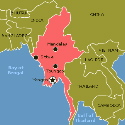Once again, the news from Burma rings with echoes of despair. The latest mission from the international community has ended in embarrassment -- not for the despotic generals who rule Burma (renamed Myanmar by its illegitimate regime), but for the United Nations and its ineffectual efforts. It seems no one who matters wants to waste any more time meeting with the U.N. envoy. And now, unconfirmed reports say the iconic leader of the pro-democracy opposition, the Nobel laureate Aung San Suu Kyi, may have started a hunger strike. Once again, Burma stands like a conscience-searing mirage on the Asian horizon, reminding us of our failure to help the most desperate. The Nigerian diplomat chosen by the U.N. to conduct negotiations, Ibrahim Gambari, has left Burma without having met Gen. Than Shwe, the head of the ruling junta, or Suu Kyi, the woman who led the country's National League for Democracy (NLD) to victorious elections 18 years ago, and has spent most of the time since then under house arrest. Opposition leaders in exile and inside the country are fed up with Gambari, who served as his country's U.N. ambassador during Nigeria's military dictatorship. Burma activists say his work has proven "worthless," a "failure." The U.N. defends him, calling for patience, saying he is engaged in a "process, not an event," in the words of Marie Okabe, deputy spokeswoman for Secretary-General Ban Ki-moon.
Burma: Diplomatic Failure Amid Rumors of a Hunger Strike

